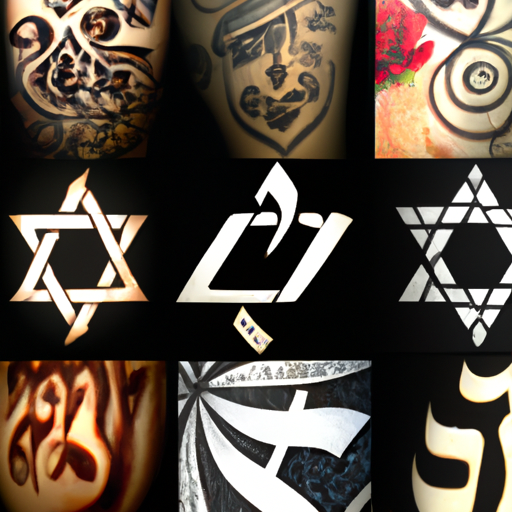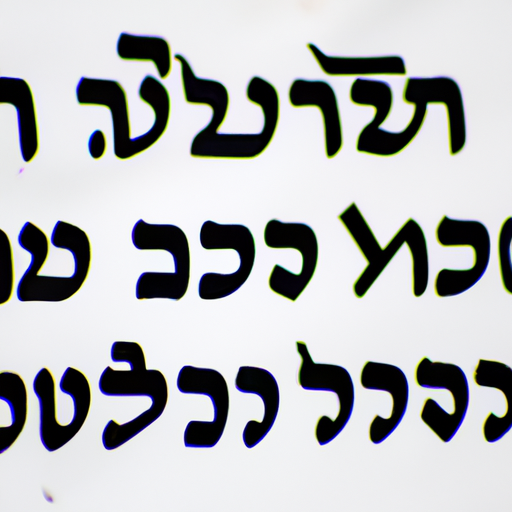This blog post delves deep into the allure and meaning behind Hebrew tattoo translations. As tattoos gain mainstream acceptance, many people are now exploring Hebrew scripts not only for their aesthetic appeal but also for their profound, spiritual meanings. The post explores different aspects of Hebrew tattoo translations, from their cultural significance to common mistakes to avoid.
Why are Hebrew Tattoos Gaining Popularity?
Hebrew tattoos have been gaining popularity in recent years, attracting people from different cultures and backgrounds. One reason for this surge in interest is the aesthetic appeal of Hebrew lettering. The elegant and intricate nature of the Hebrew alphabet adds a unique and artistic touch to tattoo designs. Additionally, Hebrew is an ancient language with a rich history and cultural significance, making it an attractive choice for those seeking a meaningful and timeless tattoo.
Another factor contributing to the popularity of Hebrew tattoos is the spiritual and religious connotations associated with the language. Hebrew is the language of the Torah, the sacred text of Judaism, and is deeply rooted in religious traditions. Many individuals choose to get Hebrew tattoos as a way to express their faith, spirituality, or connection to their Jewish heritage. These tattoos can serve as a constant reminder of their beliefs and values.
Furthermore, Hebrew tattoos offer a sense of mystery and intrigue. For those who do not speak or understand Hebrew, the language holds an air of mysticism and exoticism. Hebrew script can be seen as a form of cryptic art, allowing individuals to express themselves in a way that is not immediately obvious to everyone. This element of secrecy and exclusivity adds an allure to Hebrew tattoos, attracting individuals who want a tattoo that is both visually striking and carries a hidden meaning.

A collage of various Hebrew tattoos showcasing their artistic diversity
The Significance and Meanings of Popular Hebrew Tattoo Translations
When it comes to Hebrew tattoo translations, there are several popular phrases and words that hold significant meanings. One common choice is the Hebrew word “Ahava”, which translates to “love.” This word symbolizes the importance of love in our lives and can be a constant reminder to spread love and kindness in all aspects of life. Another popular Hebrew tattoo translation is the word “חי” (Chai), which means “life.” This powerful word represents the celebration of life and serves as a reminder to live each day to the fullest.
Another meaningful Hebrew tattoo translation is the phrase “I am my beloved’s, and my beloved is mine.” This phrase comes from the biblical book of Song of Solomon and is often used to symbolize a deep and committed love between partners. It encapsulates the idea of unconditional love and devotion.
Additionally, many people choose to get Hebrew tattoos of meaningful biblical verses or quotes. Verses such as “The Lord is my shepherd” from Psalms 23:1, or “I trust in the Lord” from Psalms 31:7, hold significant spiritual meanings and serve as a source of inspiration and strength.
Common Mistakes to Avoid when Getting a Hebrew Tattoo: Are you sure about your translation?
Getting a tattoo in a language that you’re not familiar with can be risky, and Hebrew is no exception. One common mistake to avoid when getting a Hebrew tattoo is relying solely on online translation tools or unreliable sources. While these tools may provide a basic translation, they often lack the context and nuance that is necessary for accurate Hebrew translations. It is crucial to consult with a native Hebrew speaker or a professional translator to ensure the translation is correct and conveys the intended meaning.
Another mistake to avoid is not considering the placement and size of the tattoo. Hebrew is a complex script with intricate characters, and certain designs may not be suitable for small or intricate tattoos. It is important to work with a skilled tattoo artist who is experienced in Hebrew tattoos to ensure that the design is legible and visually appealing.
Additionally, it is essential to double-check the accuracy of the translation before getting inked. Even small errors in translation can completely change the meaning of a word or phrase. Taking the time to verify the translation with an expert can save you from a lifetime of regret.
Furthermore, it is crucial to consider cultural and religious sensitivities when choosing Hebrew tattoo translations. Certain words or phrases may have specific religious connotations or be considered inappropriate in certain contexts. It is important to research and understand the cultural significance of the chosen translation to ensure that it is respectful and appropriate.

An image of a Hebrew tattoo gone wrong due to mistranslation
Inked in Hebrew: Personal Stories and Inspirations
The decision to get a tattoo in Hebrew is often deeply personal and can carry significant meaning for individuals. Many people choose to ink Hebrew words or phrases that hold personal significance or represent their values and beliefs. Here are a few personal stories and inspirations behind Hebrew tattoos:
- 1. Expressing Identity:
Some individuals choose to get Hebrew tattoos as a way to connect with their Jewish heritage or express their identity as part of the Jewish community. Hebrew is the language of the Torah and has a rich history and cultural significance. For these individuals, getting a Hebrew tattoo can be a powerful way to honor their roots and showcase their pride in their heritage. - 2. Spiritual and Inspirational Quotes:
Hebrew is often associated with spirituality and religious texts. Many people find inspiration in Hebrew scriptures and choose to ink meaningful quotes or verses on their bodies. These tattoos serve as constant reminders of their faith, providing strength and guidance in their daily lives. - 3. Commemorating Loved Ones:
Hebrew tattoos can also be a way to honor and remember loved ones who have passed away. People often choose to ink Hebrew names or phrases that hold special significance to those they have lost. These tattoos serve as a lasting tribute, keeping their memory alive and close to the heart.
While Hebrew tattoos offer a unique way to express personal beliefs, values, or declarations of love, it’s crucial to ensure accurate translations to avoid potential embarrassments. Whether you are considering a Hebrew tattoo for its beauty, spirituality, or personal significance, ensure you consult a professional who understands both the language and the cultural nuances to provide an accurate translation.